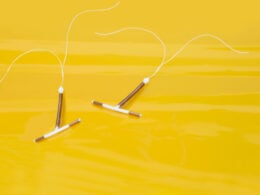With all the other concerns people have during the COVID-19 pandemic, it would seem that libido would be the last thing on their minds. It isn’t.
According to data published in a recent analysis from TermLife2Go, an independent agency that researches life insurance companies, the most-Googled mental health conditions in certain states over the past year include “low libido” and “intimacy issues.”
Perhaps the COVID-19-induced baby boom in nine months won’t be quite as huge as we thought?
Certainly it’s understandable that stress and tension (which are at an all time high) do not typically put people in the mood for romance. Then there’s the possibility that a feeling of connection is not necessarily strong between couples even if they’re sharing close spaces together. Thanks or no thanks to smartphones, many couples distance each other with “phubbing”—snubbing a person by paying more attention to one’s phone. (“Internet addiction” was another phrase that came up frequently in the TermLife2Go’s analysis of Google search terms.) In other words, we know that there are numerous and complex reasons couples are struggling with libido these days.
But there’s also a libido-killing culprit that many people may not know they’re exposed to during this time of pandemic. It happens to be something many have been exposed to since pre-pandemic times as well. I’m talking about pharmaceutical birth control.
Birth control’s connection to libido issues
The history of hormonal birth control and women’s lowered libido is well documented. It’s the ridiculous paradox that while the risk of pregnancy is lowered, seemingly freeing women to enjoy more sex, sex itself becomes less desired–thanks to birth control.
Hormonal forms of birth control, such as the Pill, patch, vaginal ring, injections, and hormonal IUD, affect women’s entire hormonal makeup, and hormone levels have a lot to do with libido. We know that throughout women’s natural menstrual cycles, when certain natural hormone levels are raised or lowered, women report being more or less interested in sex. When synthetic hormones are introduced, libido can be affected as well. We also know that some of the most common birth control side effects involve mental health, including depression, anxiety, and suicidal thoughts—side effects that don’t particularly get couples in the mood either. And, in stunning research that came out in 2013, hormonal contraceptives are even connected to the shrinking of the clitoris.
Libido issues also affect women implanted with the nonhormonal copper IUD, as many women report painful sex because of the device. To read women’s testimonies of how birth control affects their libido, check out the comments posted on the Citizen Petition to the FDA for greater transparency of birth control side effects.
Reclaiming love in the time of COVID-19
If you’ve noticed a difference in libido after changing (or starting) birth control, you may want to consider a different form of family planning.
There are ways to prevent pregnancy without taking synthetic hormones or getting implanted with a hormone-altering device, and the methods of natural birth control with the greatest effectiveness rates are Fertility Awareness-Based Methods (FABM). If you’ve been considering learning more about fertility awareness methods or Natural Family Planning (NFP), now might be the perfect time, when you and your partner are in close quarters, to learn together. Not only are there numerous resources to connect you online with trained FABM instructors (who are a necessary for achieving the high efficacy rates), you can take this time of fewer lifestyle variables to focus on learning how to read your body’s natural signs of fertility, and then target intercourse according to your family-planning goals. Along the way, you can learn more about any hormonal issues you may be experiencing, chart them down, and be one step closer to receiving help from a FABM-trained doctor to find treatment for any imbalance or reproductive disorder you may be experiencing (many are available for telehealth during the COVID-19 pandemic, and some are even offering financial assistance). To learn more, check out “How Quarantining Makes a Great Time To Switch to Fertility Awareness.”
Many women don’t notice low libido until they’re off hormonal contraceptives, and their healthy libido returns, as birth control side effects retreat. At our May 7 Gala, Natural Womanhood board member Jackie Aguilar shared her personal story in our virtual event video (starting at minute 57:20). In addition to removing libido-inhibiting drugs from your system, learning how to chart your cycle with natural family planning may also improve you and your partner’s love life.
I believe women are the best equipped to know what’s going on in their bodies, even if they don’t fully understand the cause of certain symptoms. If something feels off, something is probably off. You owe it to yourself to invest time in learning how to grow in knowledge of your body’s fertility health. It’s an investment that you can trust will make returns, not only in your bodily health, but also in your relationship.











